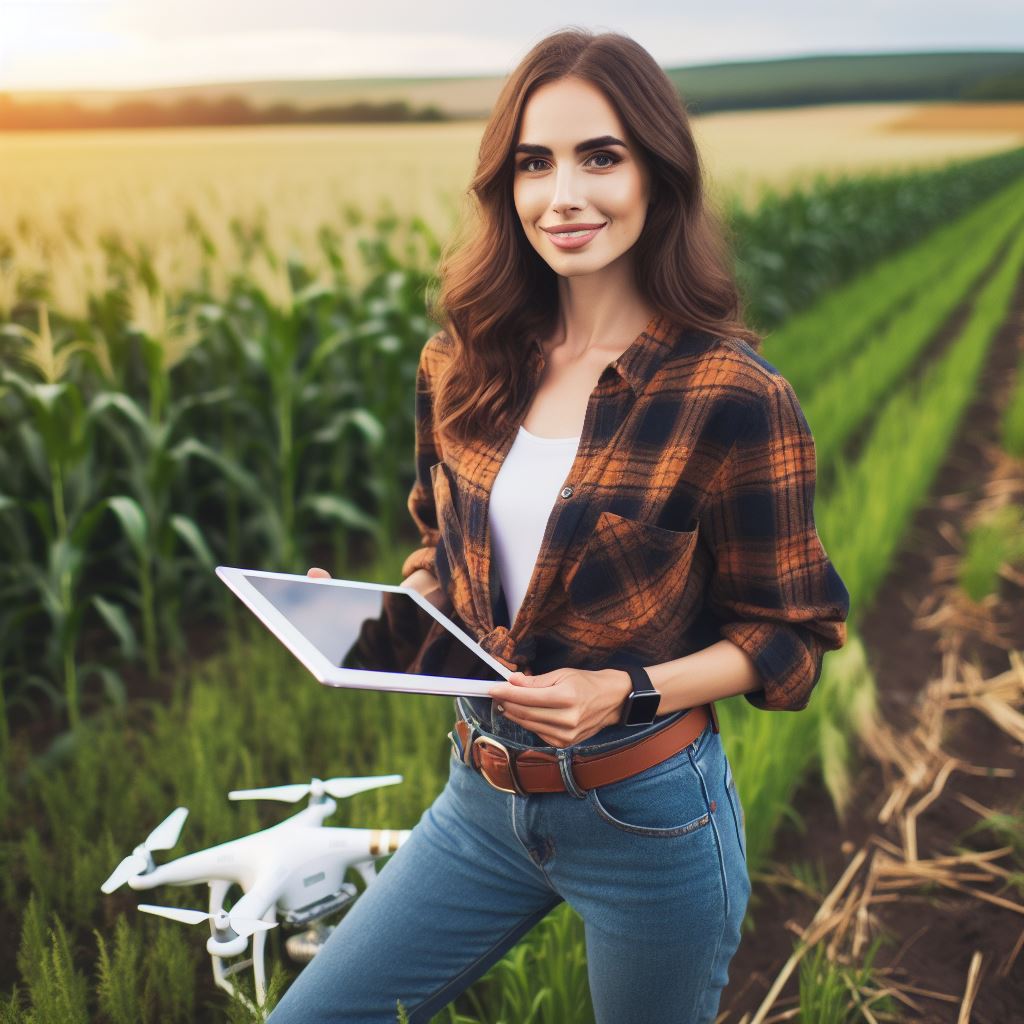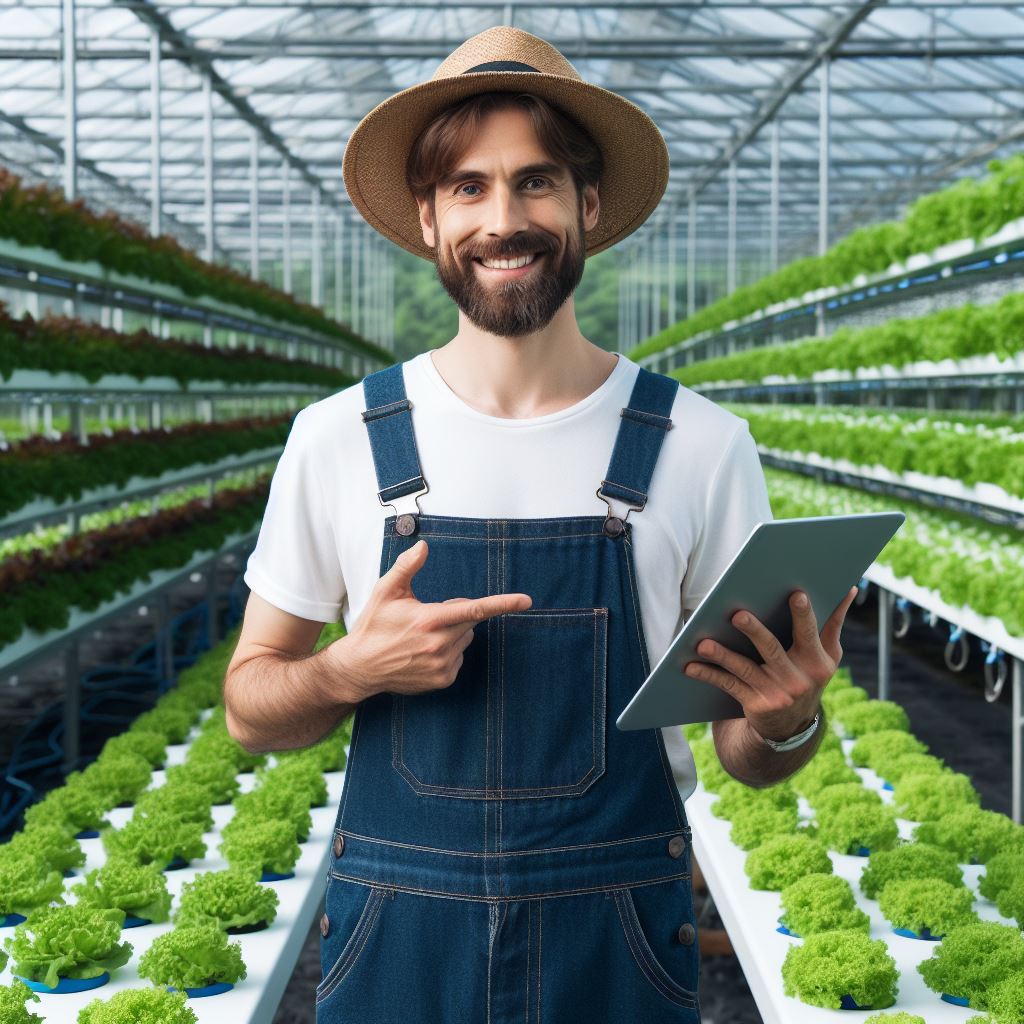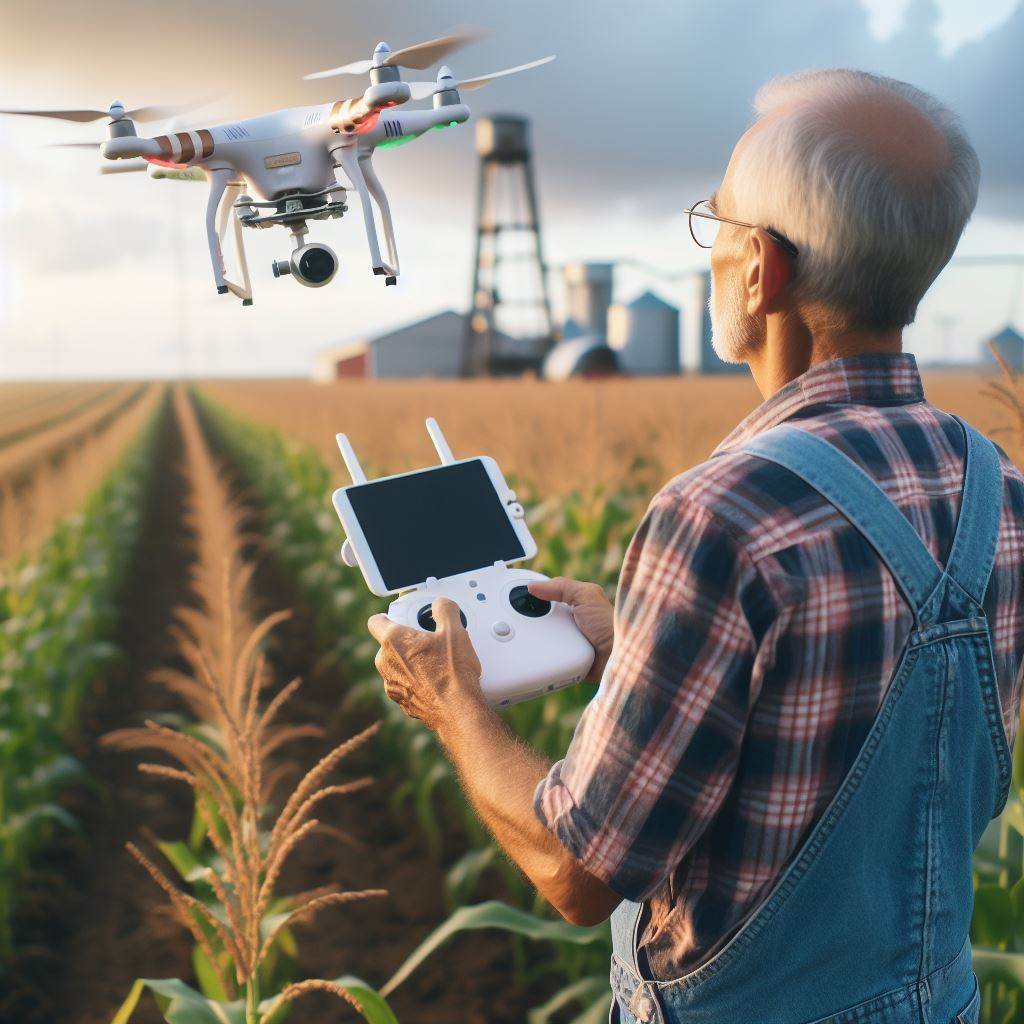Introduction
Agri-Tech and Big Data play a crucial role in modern farm management as they provide valuable insights and enable informed decision-making.
They help farmers optimize crop production, monitor livestock health, and manage resources effectively.
Agri-Tech solutions like GPS-guided machinery, weather monitoring sensors, and automated irrigation systems streamline farming operations, reduce manual labor, and improve accuracy.
Big Data analysis helps farmers predict crop yields, monitor soil quality, and detect disease outbreaks, enhancing overall farm productivity and profitability.
Agri-Tech and Big Data also facilitate precision agriculture, enabling the customization of farming practices according to specific field conditions, leading to optimized resource utilization and waste reduction.
Furthermore, these technologies aid in sustainability efforts by reducing environmental impact through precise application of fertilizers and pesticides.
In short, Agri-Tech and Big Data transform farm management, offering advanced tools and data-driven insights.
They empower farmers to decide wisely, enhancing productivity, profitability, and sustainability.
The Role of Agri-Tech in Farm Management
Agriculture is undergoing a technological revolution that is transforming the way farms are managed.
Agri-tech, the fusion of agricultural practices with modern technology, has emerged as a powerful tool in improving efficiency and productivity.
In this section, we will explore the various ways in which agri-tech is revolutionizing farm management.
Increased efficiency through automation and precision agriculture
Traditionally, farming has been a labor-intensive process requiring significant manpower.
However, agri-tech has brought automation to the forefront, reducing the reliance on human labor.
Robots and smart machines are being used for tasks such as seeding, harvesting, and livestock management. By automating these processes, farmers can improve operational efficiency and save time and resources.
Precision agriculture is another key aspect of agri-tech.
Transform Your Agribusiness
Unlock your farm's potential with expert advice tailored to your needs. Get actionable steps that drive real results.
Get StartedThrough the use of advanced sensors, GPS technology, and big data analytics, farmers can monitor and manage their fields with precision.
This allows for targeted application of fertilizers and pesticides, reducing waste and ensuring optimal crop growth.
By adopting precision agriculture techniques, farmers can achieve higher yields with lower inputs, optimizing their resources and maximizing profitability.
Enhanced crop monitoring and yield prediction
Agri-tech has revolutionized the way farmers monitor their crops.
With the help of IoT devices and sensors, farmers can collect real-time data on soil moisture, temperature, and other environmental factors.
This data is then analyzed using big data analytics to provide valuable insights into crop health and growth patterns.
By constantly monitoring their crops, farmers can detect early signs of diseases, pests, or nutrient deficiencies.
This enables them to take proactive measures and apply targeted interventions, minimizing crop losses.
Additionally, advanced algorithms can predict yield based on historic data and environmental conditions.
This helps farmers make informed decisions regarding crop rotation, market planning, and resource allocation.
Remote sensing and satellite imagery for better farm planning
Remote sensing and satellite imagery have emerged as valuable tools in farm planning and management.
By capturing high-resolution images of fields from space, farmers can assess the health, growth, and overall condition of their crops.
They can detect variations in plant health, water stress, or pest infestations that may not be visible to the naked eye.
By analyzing this data, farmers can make informed decisions regarding irrigation, fertilizer application, and pest control.
Satellite imagery also helps in crop zoning and optimal field layout, taking into account variations in soil fertility and topography.
This allows farmers to plan their operations more effectively and maximize productivity.
Use of drones and robots for various farm activities
- The use of drones and robots in agriculture has gained significant momentum in recent years.
- Drones equipped with cameras and sensors can be used for aerial surveillance, crop health assessment, and even targeted spraying of fertilizers or pesticides.
- They provide a bird’s-eye view of the fields, allowing farmers to identify potential issues and take necessary action.
- Robots, on the other hand, can be deployed for a wide range of tasks such as weeding, pruning, and selective harvesting.
- These machines are designed to navigate through fields autonomously, identifying and eliminating weeds or collecting ripe produce with precision.
- By utilizing drones and robots, farmers can reduce labor costs, increase efficiency, and minimize the use of chemicals.
In essence, agri-tech is revolutionizing farm management by improving efficiency, enhancing crop monitoring, enabling better farm planning, and introducing innovative farm activities.
By embracing these technological advancements, farmers can optimize their resources, increase productivity, and contribute to sustainable agricultural practices.
Read: Future of Farming: AI and Machine Learning in Agri-Tech
The Role of Big Data in Farm Management
Agriculture is no longer solely reliant on traditional practices and intuition.
With the advancement of technology, the agricultural sector has witnessed a significant transformation.
One of the innovations that have revolutionized farm management is the integration of agri-tech and big data.
The collection and analysis of large amounts of data play a crucial role in enhancing agricultural practices and decision-making processes.
Collection and Analysis of Large Amounts of Data
The agricultural industry generates a tremendous amount of data through various sources, including sensors, machinery, and climate monitoring systems.
Showcase Your Farming Business
Publish your professional farming services profile on our blog for a one-time fee of $200 and reach a dedicated audience of farmers and agribusiness owners.
Publish Your ProfileWith the help of advanced technologies and IoT devices, farmers can collect data related to soil conditions, weather patterns, crop growth, and livestock health, among others.
Big data analytics enables the management and interpretation of this vast volume of information.
The collected data undergoes rigorous analysis using algorithms and machine learning techniques.
By processing this information, farmers gain valuable insights into their operations, allowing them to identify patterns, trends, and correlations that were previously undetectable.
Consequently, the collection and analysis of big data become fundamental assets in achieving farm management goals.
Utilizing Data to Make Informed Decisions
Big data plays a crucial role in farm management decision-making.
By leveraging data-driven insights, farmers can make informed decisions that optimize their operations and maximize productivity.
For instance, analyzing historical weather data can help farmers determine the optimal planting season or predict pest and disease outbreaks.
Moreover, big data enables predictive modeling, which empowers farmers to anticipate market demand and adjust their production accordingly.
By aligning their decisions with real-time data and market trends, farmers can minimize waste, reduce costs, and increase profitability.
In this way, big data enhances the decision-making process and empowers farmers to stay ahead in a competitive market.
Enhancing Farm Productivity and Sustainability
Big data has the potential to revolutionize farm productivity and sustainability.
By analyzing data related to crop yields, nutrient levels, and water usage, farmers can optimize their practices to ensure maximum productivity while minimizing resource wastage.
With access to real-time data, farmers can implement precision farming techniques, such as precise irrigation and targeted application of fertilizers and pesticides.
Furthermore, big data can assist farmers in adopting sustainable farming practices.
By analyzing environmental factors and monitoring ecosystems, farmers can make informed decisions that prioritize conservation and reduce the impact on natural resources.
By integrating big data analytics into their farm management practices, farmers can achieve a balance between productivity and sustainability.
Improving Resource Allocation and Optimizing Inputs
- Efficient resource allocation is a crucial aspect of farm management.
- Big data analytics enables farmers to monitor and optimize resource usage, leading to significant cost savings.
- By analyzing data on soil fertility, nutrient levels, and climate, farmers can determine the appropriate amounts of fertilizers and pesticides required for optimal crop growth.
- Data-driven insights can also optimize irrigation practices by adjusting water usage based on real-time weather conditions.
- This not only conserves water but also prevents overwatering, reducing the risk of crop diseases and improving water efficiency.
- Through the smart allocation of resources, big data enhances farm management processes and ensures sustainable agricultural practices.
In general, big data is transforming farm management by allowing farmers to collect, analyze, and leverage vast amounts of data.
The integration of agri-tech and big data empowers farmers to make informed decisions, enhance productivity and sustainability, and optimize resource allocation.
As technology continues to advance, the role of big data in farm management will only become more prominent.
Read: Drones in Agri: Boosting Crop Efficiency
Key Applications of Agri-Tech and Big Data in Farm Management
Agricultural technology, commonly known as Agri-Tech, combined with Big Data has revolutionized farm management in recent years.
This powerful combination has enabled farmers to make data-driven decisions and optimize their operations.
Here are some key applications of Agri-Tech and Big Data in farm management:
Soil monitoring and fertility management
- Agri-Tech sensors collect data on soil moisture, nutrient content, and pH levels.
- This data helps farmers to analyze soil health and make informed decisions about fertilizer application.
- Big Data analysis provides insights for optimizing soil fertility management practices.
Crop protection and disease management
- Agri-Tech tools, such as drones and satellite imagery, monitor crop health and detect pests or diseases.
- By analyzing this data, farmers can take timely actions to protect their crops and prevent yield loss.
- Big Data analytics enable predictive models for disease outbreaks and guide farmers in implementing preventive measures.
Irrigation and water management
- Agri-Tech devices monitor soil moisture levels, weather patterns, and evaporation rates.
- This data helps farmers to optimize irrigation, reduce water usage, and prevent over- or under-watering.
- Big Data analysis enables real-time decision-making and precise irrigation scheduling.
Livestock management and tracking
- Agri-Tech wearables and RFID tags enable real-time monitoring of livestock health and location.
- Data analysis helps farmers to identify health issues, track behavior patterns, and predict breeding cycles.
- Big Data analytics optimize feeding schedules, ensure animal welfare, and improve overall productivity.
Supply chain optimization and traceability
- Agri-Tech and Big Data enable better tracking of agricultural products throughout the supply chain.
- Data analytics provide insights into product quality, shelf life, and storage conditions.
- Traceability systems ensure food safety, reduce waste, and improve transparency for consumers.
Ultimately, Agri-Tech and Big Data have become indispensable tools for modern farm management.
The applications of these technologies are numerous and have significantly transformed various aspects of agriculture.
From soil monitoring to crop protection, irrigation management to livestock tracking, and supply chain optimization to traceability, Agri-Tech and Big Data are driving efficiency and sustainability in farming operations.
By harnessing the power of data, farmers can make well-informed decisions and achieve higher productivity while minimizing risks and environmental impact.
Read: Drones: Transforming Agricultural Practices

Challenges and Limitations of Agri-Tech and Big Data
While agri-tech and big data have the potential to revolutionize farm management, they also face several challenges and limitations that need to be addressed for widespread adoption and success.
Data Privacy and Security Concerns
One of the major concerns with using big data in agriculture is the privacy and security of the collected information.
Farmers, as well as consumers, worry about the safety of their data and the potential for misuse.
Unauthorized access and data breaches pose significant risks that need to be addressed through robust security measures and regulations.
High Costs of Adopting and Implementing Technology
Implementing agri-tech solutions and leveraging big data requires significant investment in hardware, software, and training.
The high costs associated with purchasing and maintaining technology can be a barrier for many farmers, particularly small-scale ones with limited financial resources.
Government support and subsidies, as well as partnerships with technology providers, can help alleviate these costs and incentivize adoption.
Limited Access to Technological Infrastructure in Rural Areas
Rural areas often lack the necessary technological infrastructure, such as high-speed internet connectivity, which is crucial for the successful deployment of agri-tech solutions.
Limited access to the internet can hinder farmers’ ability to collect and analyze data in real-time, limiting the effectiveness of these technologies.
Governments and stakeholders should prioritize improving rural connectivity to bridge this digital divide.
Skill Gaps and Training Requirements for Farmers
- The effective use of agri-tech and big data requires farmers to possess the necessary skills and knowledge.
- However, many farmers, especially older generations, may lack the technological literacy and understanding to fully utilize these tools.
- Training programs and initiatives are essential to educate farmers about the benefits and functionalities of the technology, enabling them to make informed decisions and maximize its potential.
In a nutshell, while agri-tech and big data offer immense potential in transforming farm management, several challenges and limitations need to be overcome.
Showcase Your Farming Business
Publish your professional farming services profile on our blog for a one-time fee of $200 and reach a dedicated audience of farmers and agribusiness owners.
Publish Your ProfileData privacy and security concerns, high costs of adoption, limited access to technology in rural areas, and skill gaps among farmers are some of the key obstacles that must be addressed.
By addressing these challenges, we can unlock the full potential of agri-tech and big data, revolutionizing the agricultural sector for a more sustainable and productive future.
Read: Farm Drones: Revolutionizing Crop Management
Successful Case Studies and Real-world Examples
Integration of Agri-Tech and Big Data in large-scale commercial farming
Large-scale commercial farming operations have embraced the integration of Agri-Tech and Big Data to enhance their management practices.
The use of advanced technologies, such as IoT sensors, drones, and satellite imagery, allows farmers to collect vast amounts of data.
These data points provide insights into soil health, crop growth stages, weather, and pest conditions, all in real-time.
By analyzing this data, farmers can make informed decisions regarding irrigation, fertilization, and pest control, thereby optimizing yields and minimizing costs.
For example, a large-scale corn producer in the United States implemented an Agri-Tech and Big Data solution, resulting in a 15% increase in yields and a 20% reduction in water usage.
Successful implementation in smallholder and subsistence farming
Agri-Tech and Big Data solutions are not limited to large-scale commercial farms and have proven successful in smallholder and subsistence farming as well.
In countries like India, where smallholder farmers make up a significant portion of the agricultural workforce, technology-driven interventions have brought about positive changes.
Through the use of mobile apps, farmers can access real-time market information, weather updates, and expert advice, improving their decision-making capabilities.
In addition, remote sensing technologies help smallholder farmers monitor crop health and optimize resource allocation.
As a result, small-scale farmers have witnessed increased yields, reduced post-harvest losses, and improved incomes.
Collaborative initiatives between agri-tech companies and farmers
The success of Agri-Tech and Big Data in transforming farm management can be attributed to collaborative efforts between technology providers and farmers.
Agri-tech companies are partnering with farmers to co-create solutions tailored to their specific needs and challenges.
This collaboration ensures that the technology is practical, user-friendly, and addresses the unique requirements of different regions and crops.
For instance, a collaboration between an agri-tech startup and rice farmers in Southeast Asia led to the development of a mobile app that helps farmers monitor field conditions and make data-driven decisions.
Impact on farm profitability, efficiency, and sustainability
- The integration of Agri-Tech and Big Data has had a significant impact on farm profitability, efficiency, and sustainability.
- By optimizing resource allocation based on data insights, farmers can reduce input costs and maximize returns.
- Remote monitoring and early pest detection allow for timely interventions, minimizing crop losses and ensuring higher yields.
- Moreover, precision agriculture techniques made possible by Agri-Tech and Big Data help reduce the use of pesticides, fertilizers, and water, promoting sustainable farming practices.
- Such sustainable practices not only benefit the environment but also contribute to long-term profitability.
Basically, successful case studies and real-world examples highlight the transformative potential of Agri-Tech and Big Data in farm management.
From large-scale commercial farming to smallholder agriculture, these technologies have improved decision-making, increased yields, and enhanced sustainability.
Collaborations between technology providers and farmers are crucial for customizing solutions, ensuring their practicality and usability.
The widespread adoption of Agri-Tech and Big Data has the potential to revolutionize the agricultural sector, making it more efficient, profitable, and sustainable.
Find Out More: Agri Drones: Beyond Just Surveillance
Future Trends and Outlook
Advancements in sensor technologies and data collection methods
Technology is advancing rapidly, with new sensors and data collection methods being developed.
These advancements will revolutionize farm management by providing real-time data on soil conditions, crop health, and weather patterns.
Integration with artificial intelligence and machine learning
The integration of agri-tech with artificial intelligence and machine learning brings immense potential to farm management.
By analyzing large sets of data, AI and machine learning algorithms can identify patterns, predict outcomes, and make recommendations.
For example, these technologies can provide insights on the optimal time for planting, watering, and harvesting crops, enabling farmers to maximize their productivity and profitability.
Adoption of blockchain technology for transparency and trust
Blockchain technology provides a secure and transparent way to record and verify transactions.
It can be utilized in the agri-tech sector to ensure transparency in the supply chain, from seed to table.
This will build trust among consumers and enable traceability of agricultural products.
Potential regulatory implications and policy considerations
- As agri-tech and big data continue to transform farm management, there may be regulatory implications and policy considerations.
- Governments and regulatory bodies must adapt their policies to address privacy, data ownership, and cybersecurity concerns while fostering innovation and maximizing the benefits of these technologies.
- Moreover, issues like data sharing and interoperability should be addressed to unlock the full potential of agri-tech and big data.
- Standardization of data formats and protocols will enable seamless integration and collaboration among different stakeholders in the agricultural ecosystem, including farmers, researchers, and policymakers.
Therefore, the future of agri-tech and big data in farm management looks promising.
Advancements in sensor technologies, integration with artificial intelligence, adoption of blockchain technology, and the need for appropriate regulations will shape the trajectory of this transformation.
With effective implementation and support, these technologies have the potential to revolutionize the way we manage farms, optimize productivity, ensure food safety, and contribute to sustainable agriculture.
You Might Also Like: Biochar: Revolutionizing Soil Management
Conclusion
Agri-Tech and Big Data have revolutionized farm management, enabling farmers to make data-driven decisions, optimize resources, and increase productivity.
By collecting and analyzing vast amounts of data, Agri-Tech tools provide valuable insights into crop health, soil conditions, weather patterns, and market demands.
This information empowers farmers to implement precision agriculture techniques, minimize waste, optimize irrigation schedules, and reduce the use of chemicals.
Furthermore, Agri-Tech solutions improve supply chain management, allowing farmers to streamline operations, reduce costs, and enhance traceability and transparency.
Despite the numerous benefits, adopting Agri-Tech and Big Data solutions may pose challenges for some farmers.
Issues such as access to reliable internet connectivity, the cost of implementing new technologies, and the need for technical expertise may hinder widespread adoption.
Showcase Your Farming Business
Publish your professional farming services profile on our blog for a one-time fee of $200 and reach a dedicated audience of farmers and agribusiness owners.
Publish Your ProfileTherefore, ongoing research and development efforts are crucial to address these challenges, improve affordability, and make the technology more accessible to farmers of all sizes and locations.
The future of agriculture lies in the integration of Agri-Tech and Big Data.
It is imperative for farmers to embrace these innovative solutions to overcome traditional farming limitations and maximize efficiency, sustainability, and profitability.
By harnessing the power of technology and data, farmers can stay ahead in the rapidly evolving agricultural landscape, ensure food security, and contribute to a more sustainable future for the planet.




